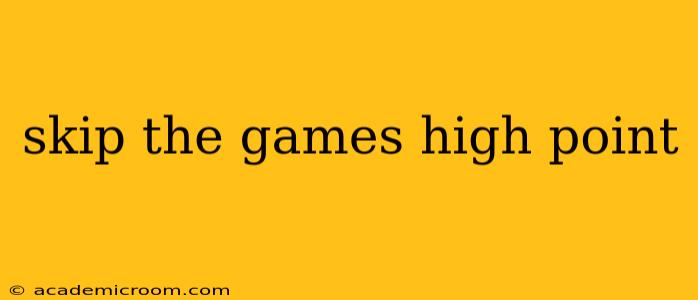For many, the high point of a game, that exhilarating moment of victory or the crushing weight of defeat, is the culmination of the experience. But what if you could skip that high point, or at least strategically manage its impact? This isn't about avoiding challenges; it's about understanding how to navigate the emotional roller coaster of competition and leverage that knowledge for consistent success. This article explores various strategies for managing the "high point" in different contexts – from video games to competitive sports and even everyday life challenges.
What Does "Skipping the High Point" Even Mean?
The phrase "skipping the high point" is metaphorical. It doesn't literally mean avoiding the peak experience of a game or competition. Instead, it refers to a mindset shift: focusing less on the immediate outcome (the win or loss) and more on the process, the journey, and the continuous improvement. It's about maintaining a level-headed approach regardless of the result, learning from both victories and defeats, and consistently striving for growth.
How to Skip the High Point in Video Games
In the world of video games, "skipping the high point" can manifest in several ways:
H2: Is it better to focus on the process rather than the outcome in gaming?
Yes, absolutely! Focusing solely on the outcome – winning or achieving a high score – can lead to frustration and burnout. By shifting your focus to mastering mechanics, exploring strategies, and improving your skills, you'll find the gaming experience more rewarding, regardless of the final result. Think of it like this: the thrill of mastering a difficult boss fight is often more satisfying than simply defeating it on your first try.
H2: How can I avoid getting too attached to winning in video games?
Detaching from the outcome involves setting realistic expectations. Accept that losses are inevitable parts of the learning process. Use defeats as opportunities for analysis – where did you make mistakes? What could you have done differently? Celebrate small victories along the way – mastering a new technique, improving your reaction time, or discovering a new strategy. This approach keeps the focus on self-improvement, rather than solely on winning.
H2: What are some strategies for maintaining a positive attitude even after losing in a video game?
Maintaining a positive outlook requires self-compassion and resilience. Remember that skill improvement takes time and practice. Don't dwell on past mistakes; instead, use them as learning opportunities. Consider taking a break from the game if you're feeling frustrated, then return with a fresh perspective. Focusing on the enjoyment of the gameplay itself, rather than solely on the result, can also help.
Skipping the High Point in Competitive Sports
In the realm of competitive sports, the high point – winning a championship, scoring the winning goal, or breaking a personal record – is often the culmination of years of dedicated training and sacrifice. However, focusing solely on that singular moment can be detrimental to long-term success:
H2: How can I manage the pressure of high-stakes competitions?
Managing pressure involves developing mental resilience. Techniques like mindfulness, visualization, and positive self-talk can help athletes stay focused and calm under pressure. Preparation is crucial; knowing your game plan inside and out reduces anxiety. Remember to focus on the process, your training, and your performance, rather than solely on the outcome.
H2: What is the importance of consistent effort over immediate results in sports?
Consistent effort builds a strong foundation for success. Immediate results can be fickle and unpredictable; consistent effort yields gradual but sustainable improvement. This allows for growth, even in the face of setbacks. The journey of continuous improvement is often more rewarding than the momentary thrill of a single victory.
Skipping the High Point in Everyday Life
The concept of "skipping the high point" applies even beyond games and sports. It's about approaching challenges with a focus on growth and learning, rather than solely on achieving immediate gratification:
H2: How can I focus on the process rather than just the result in my daily life?
In everyday life, apply the same principles: break down large tasks into smaller, manageable steps. Celebrate small victories along the way. Learn from mistakes without dwelling on them. Focus on continuous improvement, rather than striving for perfection. This approach fosters resilience and a more fulfilling journey.
H2: How do I avoid feeling disappointed when I don't reach my goals immediately?
Setbacks are inevitable. Remember that progress isn't always linear. Maintain a positive mindset, learn from mistakes, and adjust your approach as needed. Celebrate your efforts and acknowledge your progress, even if you haven't reached your ultimate goal yet.
By shifting your focus from the immediate outcome to the ongoing process of improvement, you can create a more fulfilling and sustainable path to success, regardless of the context. "Skipping the high point" isn't about avoiding success; it's about embracing the journey and finding lasting satisfaction in the pursuit of excellence.
